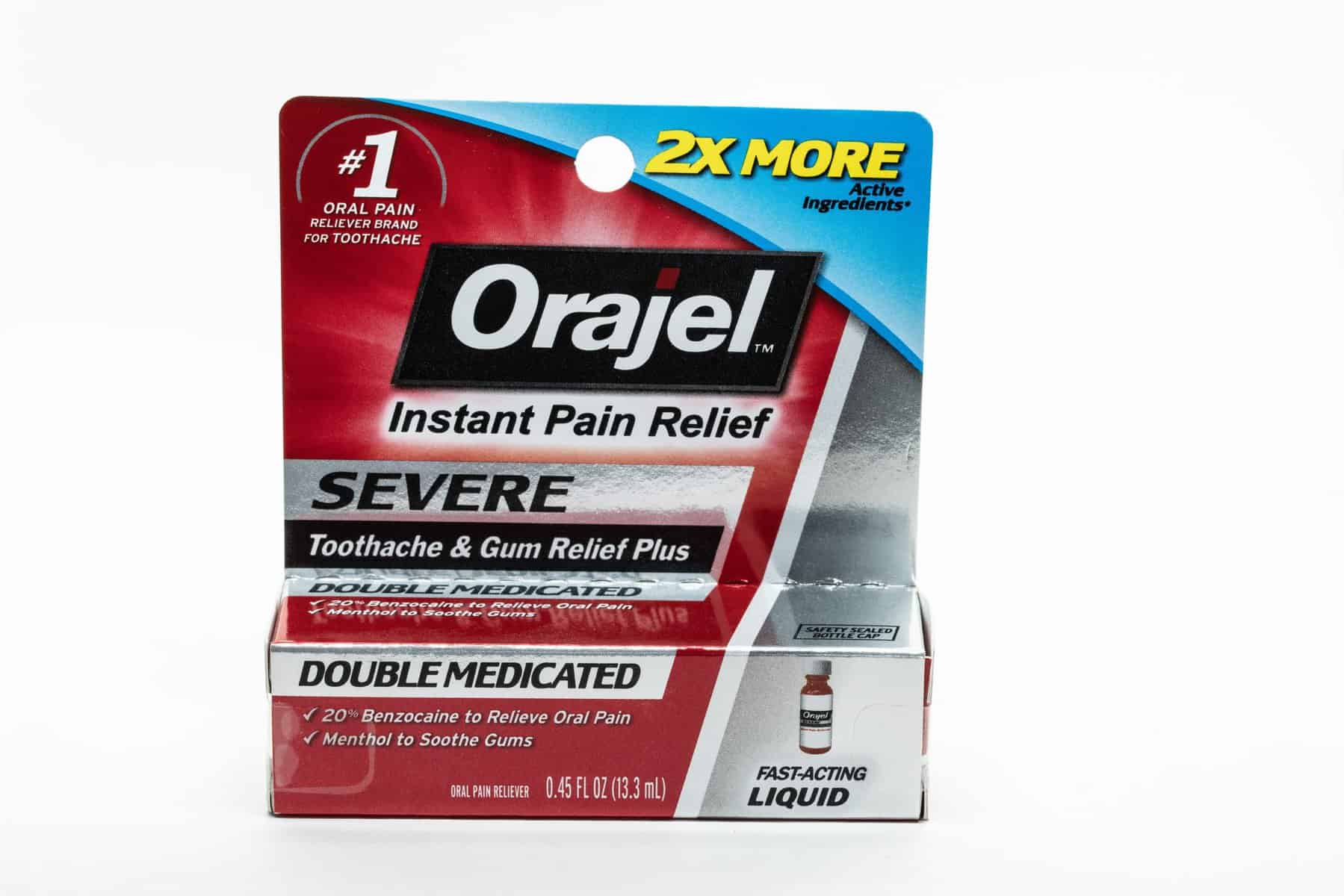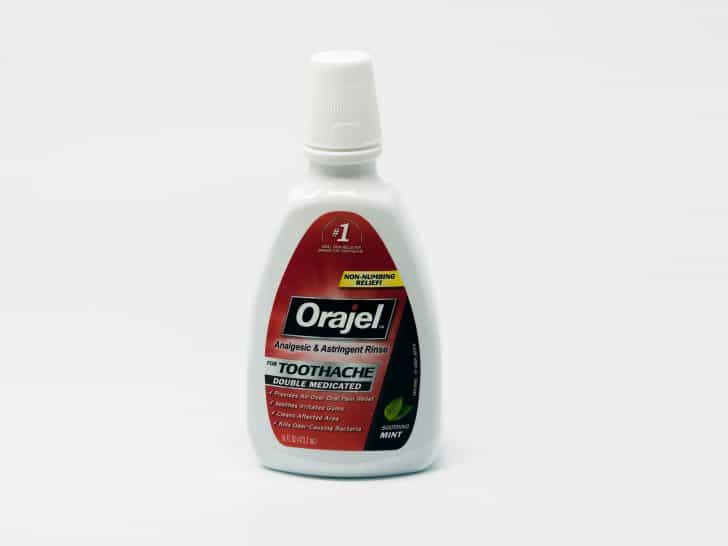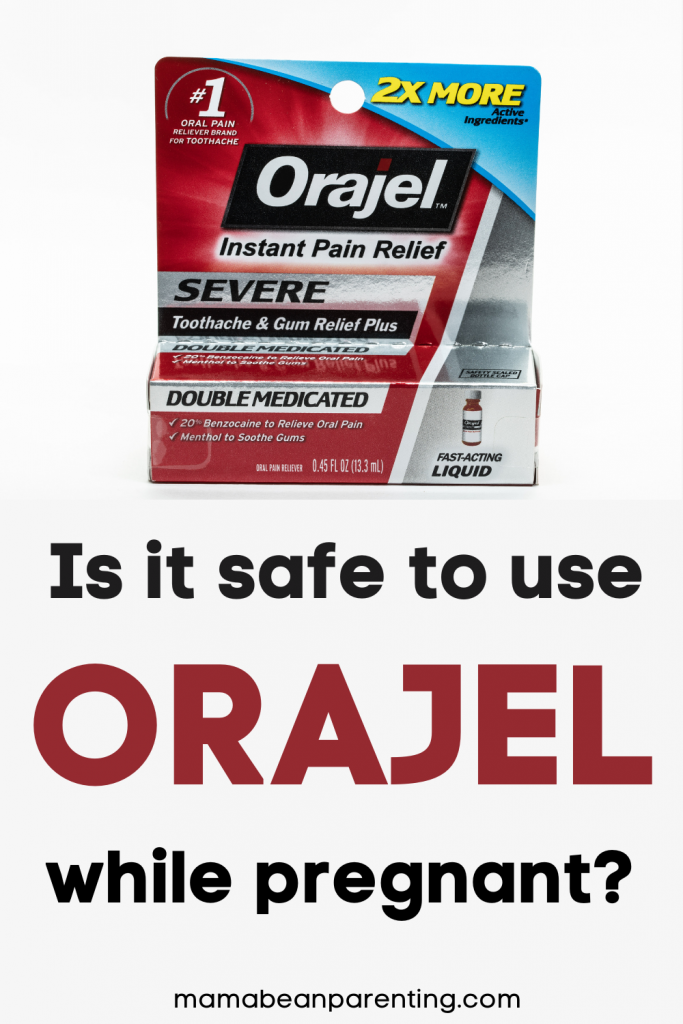Orajel acts as a pain reliever, an anesthetic that provides pain relief for mild to severe toothaches, irritated canker sores, and cold sores.
While it may be an effective oral care solution, the question stands: is it safe to use Orajel while pregnant? Let’s find out!
Being pregnant and worrying about medication usage go hand-in-hand, especially if you wonder if is Orajel safe while pregnant.
We’re here to make it simple for you. However, the purpose of this article is not only to deduce whether or not it’s safe to use Orajel while pregnant but to understand the risks and benefits and to provide alternative options and guidance if and when necessary.
Among many physical discomforts and emotional challenges, most expecting mothers happen to experience toothache during pregnancy. That’s why it’s important to stay informed as to what kind of medication and treatment options you can safely use.
Before we proceed, however, it’s important to note that there’s a notable lack of scientific research and evidence in regard to whether or not it’s safe to use Orajel while pregnant and whether is there any pregnancy risk while using it.
After all, you are obliged to secure safe pregnancy.
Well, despite the lack of scientific evidence, Orajel has been used for years as an effective oral care solution by many pregnant women without any apparent negative consequences.
Still, exercise caution. Consult with your healthcare provider before use.
Orajel 101: How It Works

Before we can provide any definite answers, we first have to understand what Orajel is and how it works. The Orajel dental gel is a topical analgesic medication applied to body surfaces with the result of providing pain relief. Applying it is easy and straightforward.
With a clean finger or swab, apply a pea-sized amount of gel to the sensitive area, which is likely to be a tooth cavity. The gel is known to provide rapid relief. Traditional painkillers take up to 30 minutes to take effect, but Orajel relieves symptoms in a matter of seconds.
Naturally, this differs on a case-to-case basis. In general, however, this toothache gel has been proven to work quite efficiently, but are there any risks to using Orajel in pregnancy? Is it safe for your oral health, and is Orajel aligned in any risk categories?
Most commonly used to treat oral pain caused by toothaches, canker sores, and sore gums, the active ingredients contained in Orajel are benzocaine and lidocaine, which act as local anesthetics that numb the affected area and rapidly lessen the symptoms of toothache.
Benzocaine provides relief by temporarily blocking the transmission of pain signals to the brain. Benzocaine is contained in a variety of pain-relieving medications. For expecting mothers experiencing toothache, benzocaine offers rapid and temporary pain reduction.
However, benzocaine is also used in teething gels for infants.
On the other hand, lidocaine is a fast-acting local aesthetic similar to benzocaine, the only difference being that lidocaine doesn’t block the transmission of pain signals to the brain.
Instead, lidocaine blocks nerve impulses that are responsible for causing pain.
Together, these two ingredients make for a powerful pain-relieving gel that rapidly and effectively lessens the symptoms of a toothache. So, using Orajel while pregnant efficiently numbs the area and relieves pain, but it isn’t a substitute for conventional medicine.
After all, the relief provided by Orajel in pregnancy is only temporary, short term, and it is not made for somewhat bigger procedures like tooth extraction. Although experiences vary from person to person, the numbing effect lasts several hours.
When using Orajel while pregnant, it’s important to follow the dosage prescribed by your healthcare provider. Usually, you can safely apply this toothache gel four times a day.
Any deviation from the prescribed dosage may inevitably result in side effects such as skin irritation and allergic reactions. Like with any medication during pregnancy, it’s important to apply Orajel dental gel as prescribed and to follow safety instructions.
In essence, using Orajel while pregnant to treat toothache is effective – but can pregnant women use Orajel? Despite the discomfort you may be experiencing, it’s important to analyze the risks and benefits of applying Orajel while pregnant in order to stay safe.
Is the temporary relief worth taking chances? Due to a notable lack of scientific research, it’s important to understand its active ingredients and how they work. So, let’s take a look into potential risks and side effects that you may experience by using Orajel in pregnancy.
Do the Benefits Outweigh the Risks?

The use of Orajel in pregnancy is classified as Category C. But what does that mean? It means that the application of dental gel has certain risks that can’t be ruled out. Simply put, there are no adequate and well-controlled studies in pregnant women.
Category C implies animal studies that have established a risk to the fetus.
While for many expecting mothers, that may be sufficient information to stay clear of a potentially unsafe pharmaceutical drug – personal accounts claim that it’s safe enough.
The question remains: is safe enough good enough?
Due to the lack of proper scientific studies, we have to see if the benefits outweigh the risks. Speaking of risks, what are the potential risks of applying Orajel while pregnant?
The most common risk of using Orajel while pregnant is the potential for absorption into the bloodstream. The two main active ingredients mentioned earlier – benzocaine and lidocaine – are topical anesthetics that can technically be absorbed into the bloodstream.
When applied topically, the active ingredients can cross the placenta, which can potentially cause health issues for the developing fetus. With this safety concern in mind, many pregnant women choose to abstain from using potentially unsafe medicinal drugs.
Even though it’s a rare blood disorder, certain studies have shown that the use of benzocaine during pregnancy increases the risk of methemoglobinemia, which, in certain cases, can be life-threatening not only for you but for your developing baby, as well.
What exactly is it? Methemoglobinemia is a blood disorder that regulates how red blood cells deliver oxygen in the body. Yes, we’re talking about slim chances, but with your baby’s health and well-being in mind – does temporary relief warrant such risks?
Especially if you overuse Orajel while pregnant, the active ingredients may cause skin irritation and allergic reactions. Depending on the severity, this can be particularly harmful to both the mother and the baby. As such, it’s important to exercise caution.
Bearing in mind the lack of scientific research and studies and the potential risks, it’s our opinion and general medical advice to explore alternative treatments for oral pain as opposed to using Orajel in pregnancy because, right now, we don’t know too much about it.
From over-the-counter pain relievers to prescribed pregnancy-safe medication, there are enough alternatives and toothache remedies for you to safely use. Still, if you think that the benefits outweigh the risks, make sure to consult with a medical professional first.
Exploring Safer Alternative Options

With the information provided in regards to how safe it is to use Orajel while pregnant, it’s generally advised to opt for alternative options that are safer and equally as efficient.
So, can pregnant women use Orajel? Technically, yes, but since it may pose a risk to your developing fetus, you should avoid using Orajel while pregnant unless you’re dealing with a potentially life-threatening scenario. Otherwise, the risks always outweigh the benefits.
As an expecting mother, you have to be careful about the medications you use.
Bear in mind that applying Orajel while pregnant to relieve oral pain has a temporary effect. To make things clearer, it’s not going to make the toothache magically go away.
Therefore, a better course of action would be to see the dentist immediately.
Here are some pregnancy-safe alternatives for you to take into account:
1. Over-the-counter medications.
For pregnant women experiencing any kind of health issues – not just toothache – there’s an ample variety of pregnancy-safe over-the-counter drugs for you to use to relieve pain.
In contrast to applying Orajel while pregnant, pain relievers such as acetaminophen (Tylenol) or ibuprofen (Advil) are safe to use during pregnancy without having to leave your home. By reducing inflammation, these medications decrease pain and discomfort.
While acetaminophen and ibuprofen provide temporary relief, they’re not going to treat the cause of your issue. Take them so as to numb the pain, but don’t delay your visit to the dentist. You have to consult with a healthcare provider in order to get adequate treatment.
Other than that, as with any kind of over-the-counter drug, following the recommended dosage takes precedence, especially if you have a little baby growing inside you to worry about. Expecting mothers have to be extra careful about the medications they use.
2. Saltwater rinses and cold compresses.
A simple and effective solution, saltwater rinses help soothe inflamed gums and reduce the discomfort of canker sores. Salt, in combination with warm water, creates a rinse that can be used efficiently to clean the mouth and provided temporary relief against pain.
Saltwater rinses are easy to do, and you can do them at your home. However, they shouldn’t replace your daily oral hygiene routine. The way a saltwater rinse relieves pain is by drawing out fluid from inflamed tissues, which reduces swelling and discomfort.
Rinse your mouth with the solution for 30 to 60 seconds. Repeat as necessary.
As opposed to using Orajel while pregnant – which has a notable lack of scientific study – saltwater rinses are perfectly safe for pregnant women and offer temporary pain relief.
On the other hand, for any kind of swelling, pain, or discomfort, cold compresses can help alleviate pain in various parts of the body, including the mouth. The cold numbs the area and notably reduces blood flow, which in turn reduces swelling and provides relief.
In the case of a toothache, for example, a cold compress can be applied directly to the affected area. It’s easy to make, and you can do it at home. All it takes is wrapping a bag of frozen vegetables in a clean cloth or using a medical cold compress if you have one.
Similarly to the results of applying Orajel while pregnant, a cold compress offers temporary pain reduction for as long as you hold the ice to your skin. Since applying a cold compress for too long leads to skin and tissue damage, don’t go over 15 minutes.
3. Practicing good oral hygiene and avoiding certain foods and drinks.
A regular brushing routine is crucial, but if you’re experiencing any kind of pain and discomfort during the process, be it mild or severe, it’s time to see a dentist right away.
Bear in mind that you want to avoid certain foods and drinks, especially hot, spicy, and overly sugary foods, because they can contribute to the severity of the discomfort that you’re dealing with and lessen the efficiency of the medications you’ve been prescribed.
Since certain foods and drinks can irritate the mouth and delay the healing process, you want to identify and avoid these irritants in order to improve your health and comfort.
However, if the pain is becoming unbearable, avoiding certain irritants is the same as using Orajel while pregnant because it’s a temporary solution. You want to make sure that you see a dentist as soon as possible in order to find actual beneficial treatment.
4. Don’t postpone your trip to the dentist.
Regular dentist checkups are necessary not just for pregnant women but for everyone. Especially if you’re experiencing more severe pain and discomfort, you may be in need of prescription medications. As such, you don’t want to delay consulting with a professional.
Your dentist will provide further guidance on what kind of medications you can use safely during pregnancy. Try to remember that there are much safer alternatives as opposed to using Orajel while pregnant. After all, it’s your baby’s safety that you want to prioritize.
So, Can Pregnant Women Use Orajel?

All things considered, even if there’s the slightest chance that using Orajel while pregnant can lead to health issues for your baby – then it’s the smartest choice to avoid it. After all, you have plenty of pregnancy-safe and risk-free alternatives for expecting mothers.
So, can pregnant women use Orajel? We advise avoiding the use of Orajel while pregnant, mostly due to the active ingredient benzocaine, which has been known to have certain risks for developing fetuses since benzocaine can be absorbed into the bloodstream.
Unless new studies turn up, the current recommendation, as of writing and publishing this article, is to avoid the application of Orajel while pregnant due to the active ingredient benzocaine and to seek out other pain relief medications and treatments instead.
From other kinds of pregnancy-safe over-the-counter medications to saltwater rinses and cold compresses, there’s a variety of drugs and methods that you can rely on to alleviate your pain and discomfort until you see a dentist and get adequate medical treatment.
Final Thoughts: Can Pregnant Women Use Orajel

Ultimately, the answer to the question ‘can pregnant women use Orajel?’ is to avoid using Orajel while pregnant due to safety concerns and potential risks. Instead, as a responsible mother-to-be, you’re advised to seek alternative treatment with your dentist’s guidance.
Yes, people often use Orajel for oral pain relief, but as a pregnant woman, you have to be mindful and careful with any and all medications. You have to know what’s safe and what’s not. In this case, specifically, it’s not 100% safe to use Orajel while pregnant.
The efficiency of the topical gel is not in question, but the risks outweigh the benefits.
Instead, you can practice saltwater rinses and cold compresses to alleviate the pain and even use pregnancy-safe over-the-counter medications such as Tylenol and Ibuprofen as opposed to applying Orajel while pregnant and putting yourself and your baby at risk.
In any case, it’s important that you prioritize your baby’s health. Do so by consulting with a healthcare provider in order to find just as efficient treatments and medical solutions.

Mother of three and a primary school teacher. I’ve always loved being around children and helping them, so I chose my path as a teacher. It is sometimes hectic with three children, but I am 100 percent into it and wouldn’t change it for anything in the world.


